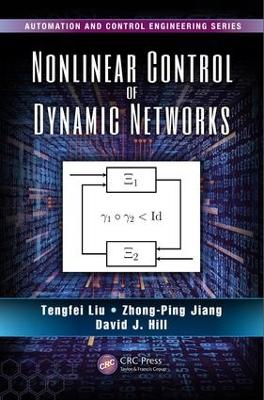Automation and Control Engineering
2 total works
Nonlinear Control of Dynamic Networks
by Tengfei Liu, Zhong-Ping Jiang, and David J Hill
Significant progress has been made on nonlinear control systems in the past two decades. However, many of the existing nonlinear control methods cannot be readily used to cope with communication and networking issues without nontrivial modifications. For example, small quantization errors may cause the performance of a "well-designed" nonlinear control system to deteriorate.
Motivated by the need for new tools to solve complex problems resulting from smart power grids, biological processes, distributed computing networks, transportation networks, robotic systems, and other cutting-edge control applications, Nonlinear Control of Dynamic Networks tackles newly arising theoretical and real-world challenges for stability analysis and control design, including nonlinearity, dimensionality, uncertainty, and information constraints as well as behaviors stemming from quantization, data-sampling, and impulses.
Delivering a systematic review of the nonlinear small-gain theorems, the text:
- Supplies novel cyclic-small-gain theorems for large-scale nonlinear dynamic networks
- Offers a cyclic-small-gain framework for nonlinear control with static or dynamic quantization
- Contains a combination of cyclic-small-gain and set-valued map designs for robust control of nonlinear uncertain systems subject to sensor noise
- Presents a cyclic-small-gain result in directed graphs and distributed control of nonlinear multi-agent systems with fixed or dynamically changing topology
Based on the authors' recent research, Nonlinear Control of Dynamic Networks provides a unified framework for robust, quantized, and distributed control under information constraints. Suggesting avenues for further exploration, the book encourages readers to take into consideration more communication and networking issues in control designs to better handle the arising challenges.
Deterministic Learning Theory for Identification, Recognition, and Control
by Cong Wang and David J Hill
Deterministic Learning Theory for Identification, Recognition, and Control presents a unified conceptual framework for knowledge acquisition, representation, and knowledge utilization in uncertain dynamic environments. It provides systematic design approaches for identification, recognition, and control of linear uncertain systems. Unlike many books currently available that focus on statistical principles, this book stresses learning through closed-loop neural control, effective representation and recognition of temporal patterns in a deterministic way.
A Deterministic View of Learning in Dynamic Environments
The authors begin with an introduction to the concepts of deterministic learning theory, followed by a discussion of the persistent excitation property of RBF networks. They describe the elements of deterministic learning, and address dynamical pattern recognition and pattern-based control processes. The results are applicable to areas such as detection and isolation of oscillation faults, ECG/EEG pattern recognition, robot learning and control, and security analysis and control of power systems.
A New Model of Information Processing
This book elucidates a learning theory which is developed using concepts and tools from the discipline of systems and control. Fundamental knowledge about system dynamics is obtained from dynamical processes, and is then utilized to achieve rapid recognition of dynamical patterns and pattern-based closed-loop control via the so-called internal and dynamical matching of system dynamics. This actually represents a new model of information processing, i.e. a model of dynamical parallel distributed processing (DPDP).

